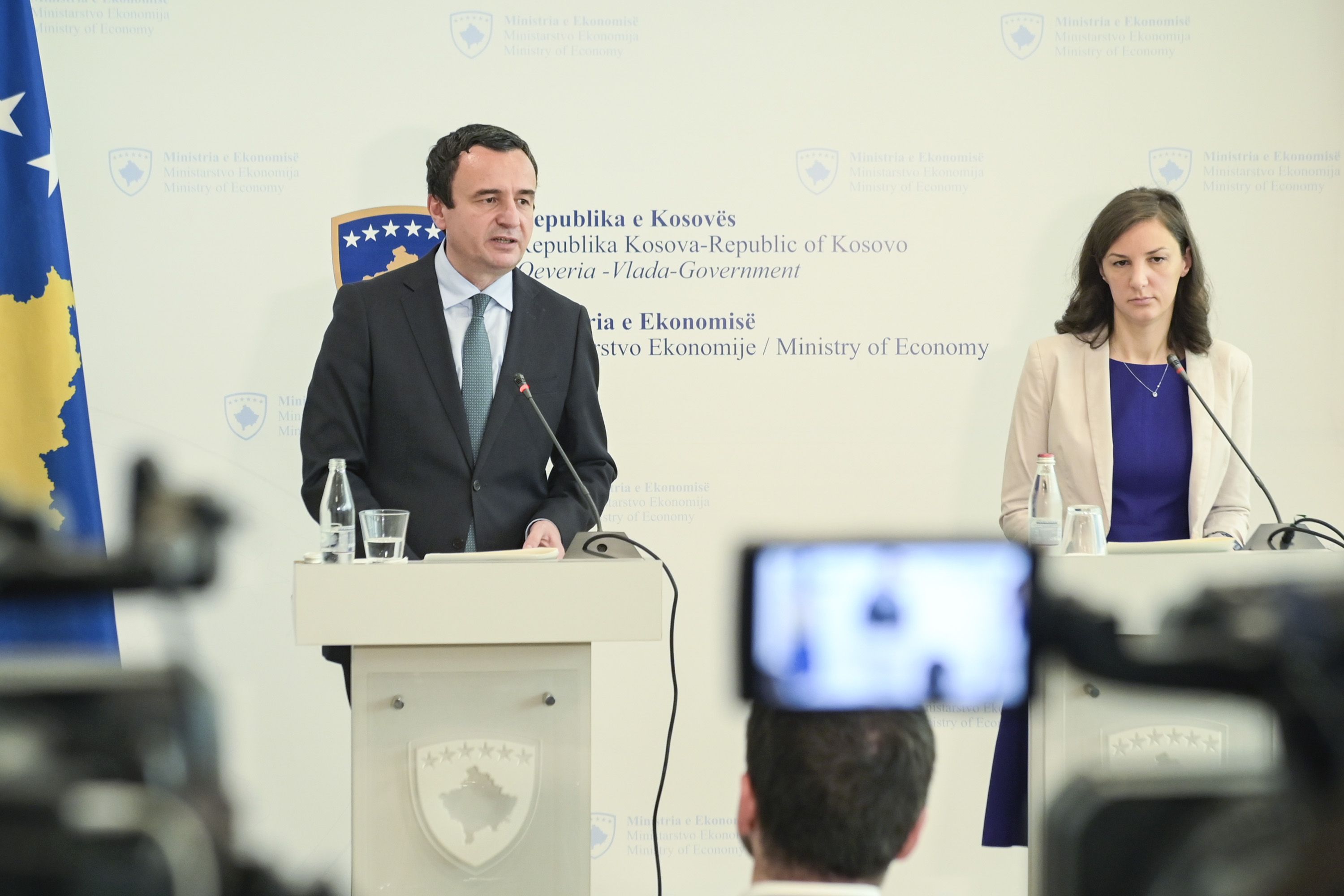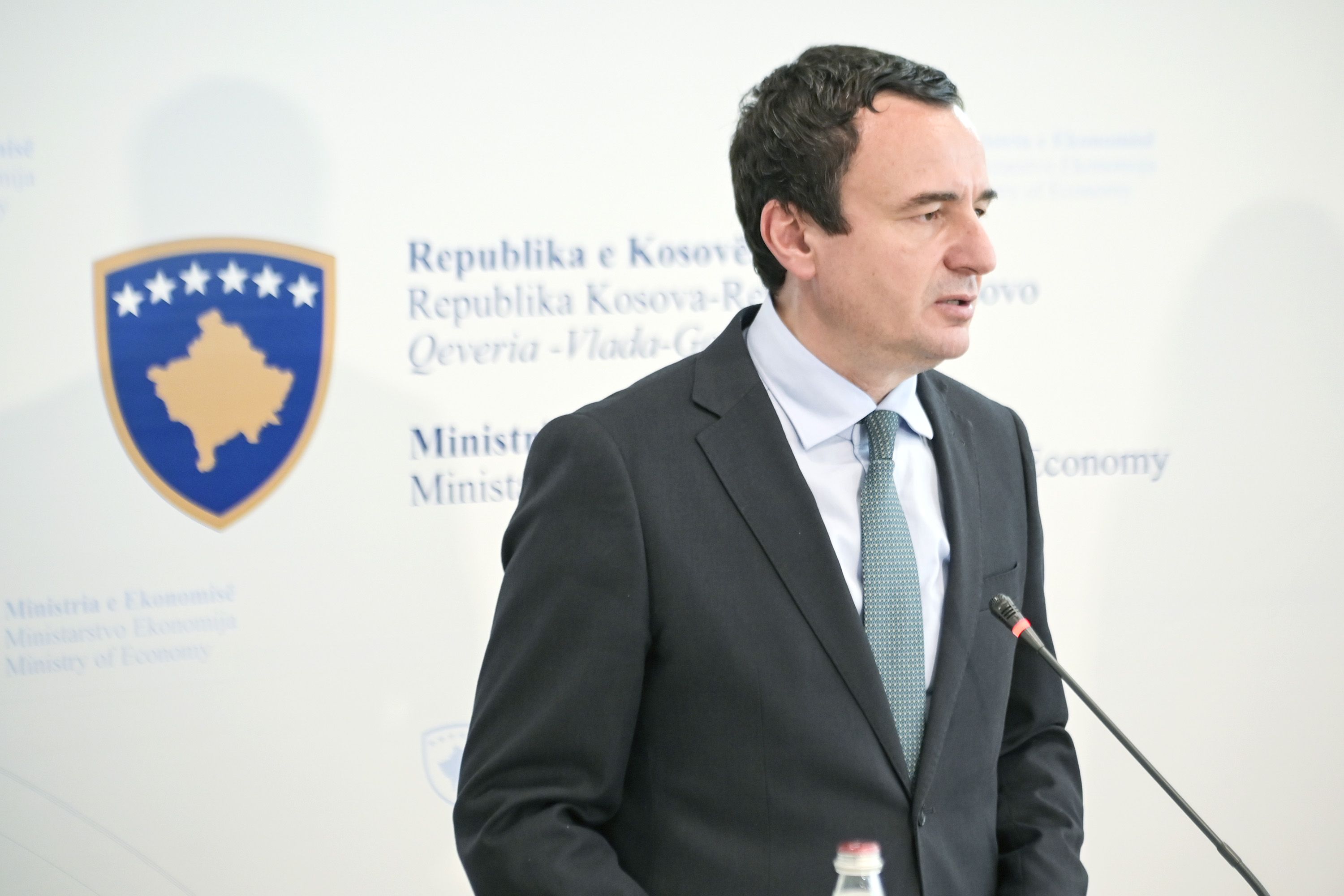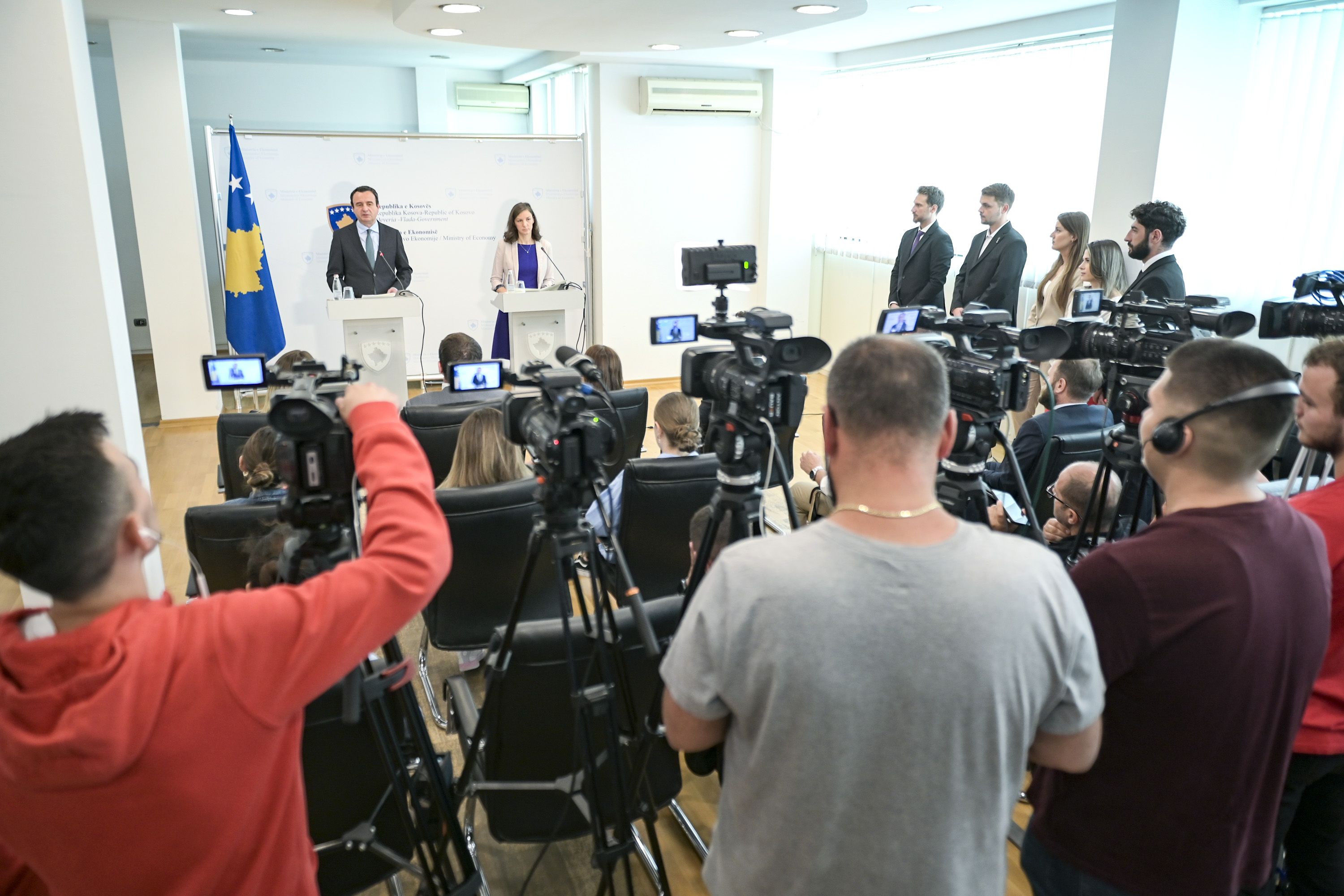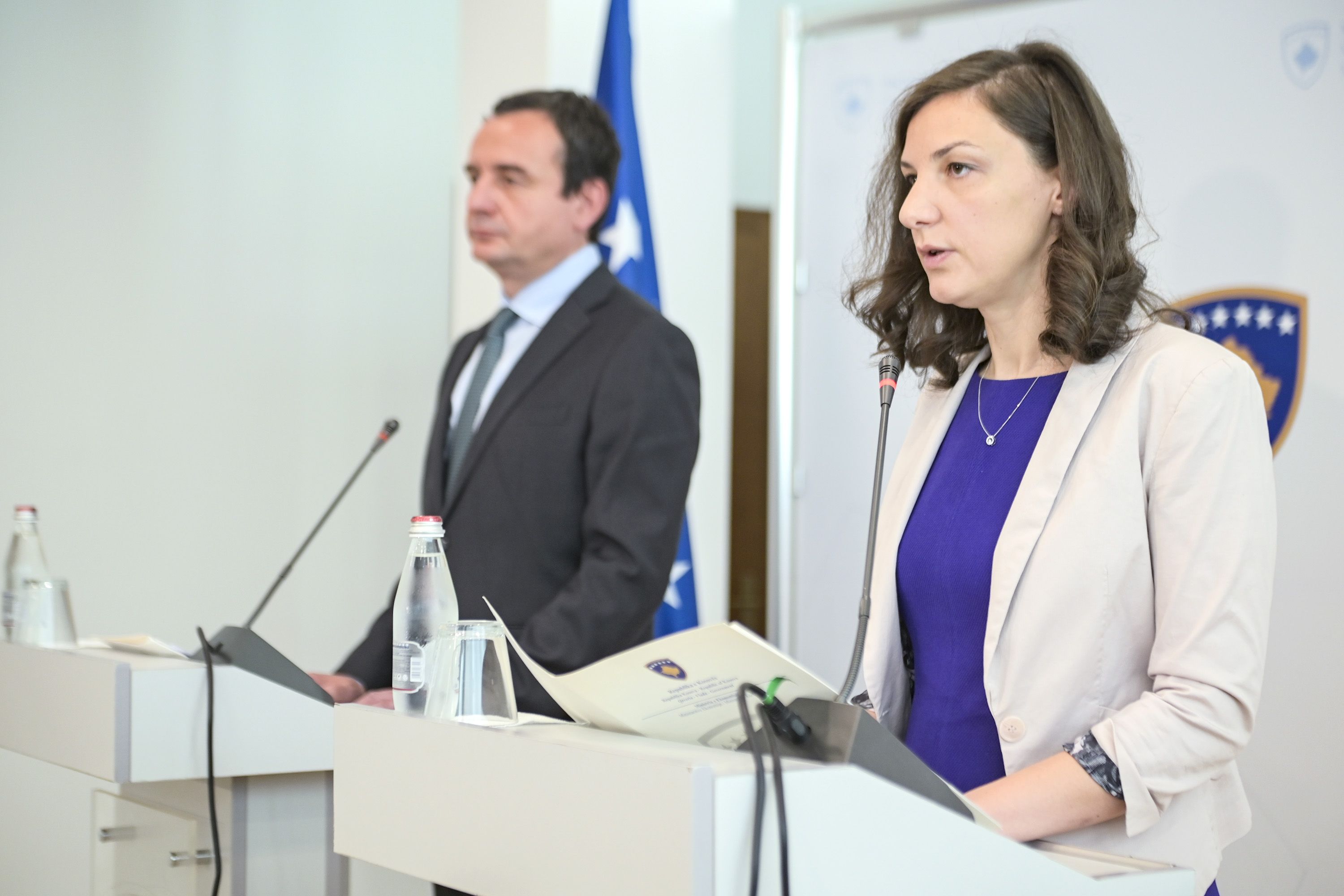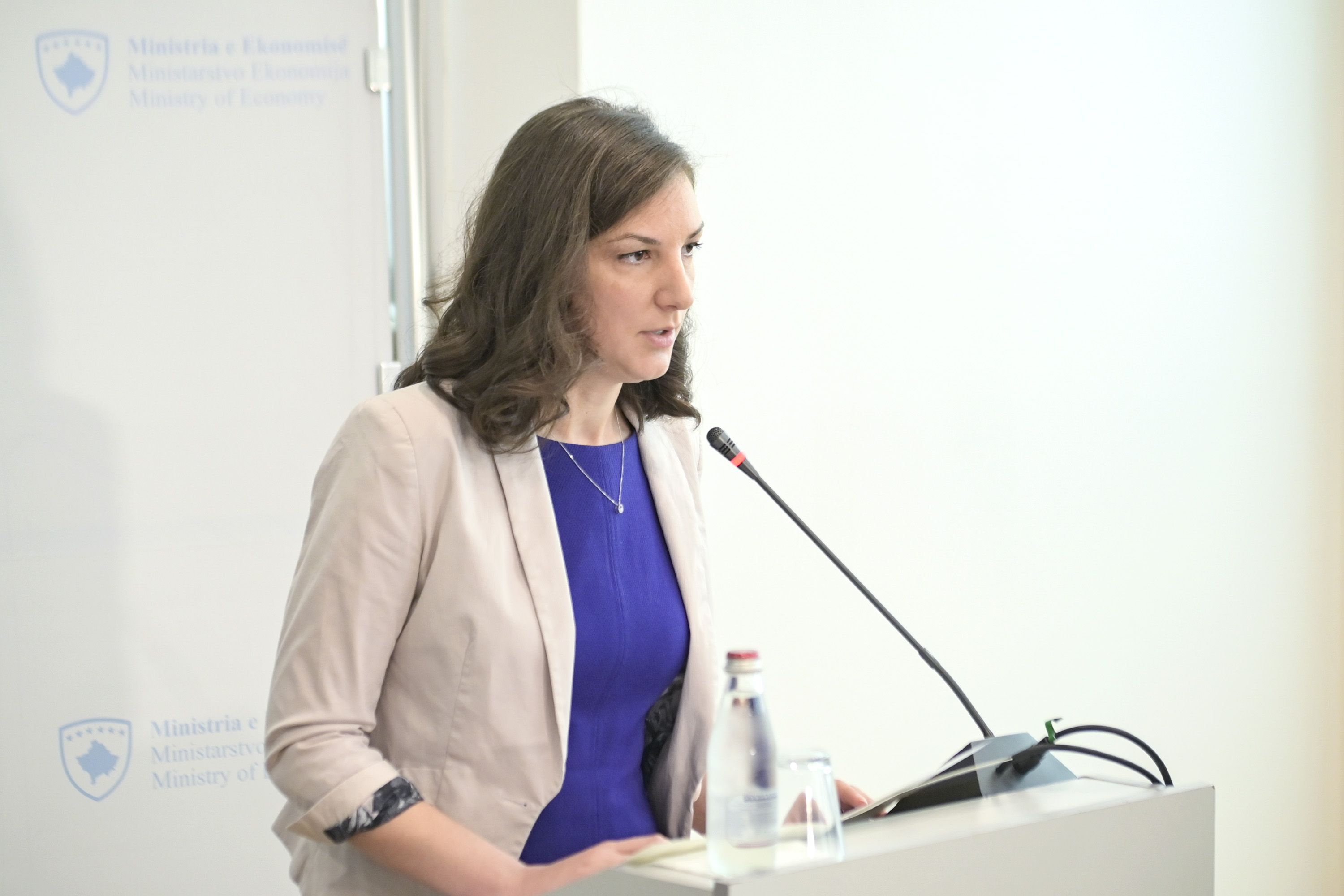Minister Rizvanolli and Prime Minister Kurti held a media conference on the agreement signed with the MCC
Prishtina, 31.07.2022 – The Minister of Economy, Artane Rizvanolli, and the Prime Minister of Kosovo, Albin Kurti, held a joint media conference in the premises of the Ministry of Economy.
The media conference was called after the Government of the Republic of Kosovo, namely the Ministry of Economy, signed the agreement in the field of energy with the Millennium Challenge Corporation (MCC), for the Compact Program in the amount of 236.7 million euro.
Below you can find the full speeches of Prime Minister Kurti and Minister Rizvanolli during the conference:
The speech of the Prime Minister of the Republic of Kosovo, Albin Kurti
Dear attendees,
Thank you for coming to this press conference today, and for welcoming this wonderful news for our country.
To date, the citizens of the Republic of Kosovo have experienced continuous energy crises. With the signing of the Compact Program Agreement for the energy sector, the Government has not only deepened its relations with our main western ally, but has concretely started to work on the transformation of the energy sector based on energy independence, the sustainability of the sector and the preservation of the environment.
In Washington DC, we signed the agreement by which the United States of America, through the Millennium Challenge Corporation, has agreed to give Kosovo a grant in the amount of 202 million dollars. This is the largest one-time grant in the history of liberated Kosovo. The Government of Kosovo has pledged to support the program with 34.7 million dollars as co-financing, thus bringing the total value of the program to 236.7 million dollars.
Investments of the Compact program will be in the ownership of Kosovo and will include three projects:
The first is energy reserves and arbitration, or batteries with a capacity of 340 MW;
The second is the development of the workforce and the inclusion of women in the energy sector, and
The third is the Project of the American Catalyst institution for Development.
These three projects will reduce the need to purchase regulatory services, reduce the cost of energy imports, and accelerate the integration of renewable resources into the grid.
At the same time, professional cadres are developed in the field of energy, and investments in the private sector are encouraged.
Therefore, a big step has been taken in the energy sector but also in the economy, so now I am passing the floor to the host, the Minister of Economy, Mrs. Artane Rizvanolli, and the signatory of this Compact Program with the Chief Executive Officer of the Millennium Challenge Corporation, Ms. Alice Albright.
The speech of the Minister of Economy, Artane Rizvanolli
Thank you very much;
Dear Prime Minister
Dear media representatives,
Members of the project development team and participants in negotiations,
Dear attendees
The energy sector in Kosovo has been in urgent need of investment for years. The Government of Kosovo and the MCC have identified the lack of reliable electricity supply as the main obstacle to the economic development of Kosovo. With the signing of this agreement, the two partner countries have committed to improve the present and future of Kosovo’s energy by stabilizing the electricity supply and accelerating its transition towards decarbonization of energy. I want to dwell on the specifics of the program and what they mean for Kosovo.
The diversification of energy sources and the decentralization of the network with producers require that we have the capacity to manage the inclusion of renewable resources in the network, maximizing the use of each capacity that is built. On the other hand, energy independence does not include only new generation capacities, but also stability of the independent energy network.
Therefore, the first Project in this program consists in the purchase and installation of high-capacity batteries, which will serve as energy reserves that will be used to stabilize the current frequency power fluctuation as a result of supply and consumption imbalance. Currently, Kosovo contracts this service in the Albanian reserve market at a financial cost, but it often happens that we contract in the European network at even higher prices when the need for regulatory services exceeds the supply. Batteries can also be used for energy arbitrage, that is, for storing energy when consumption is low and using it later during hours of high consumption, which will affect to a certain extent the reduction of the expensive import.
Furthermore, the batteries will be able to be easily integrated with solar, wind, and similar sources, thus increasing their predictability.
Most of the benefits derived from the proposed energy storage systems are related to the avoided financial costs as a result of project implementation. A preliminary calculation by the MCC team has concluded that energy reserves will save Kosovo’s electricity system at least 15 million euro per year, this value is expected to be even higher when energy prices increase as is happening these days. These findings will be part of the final cost-benefit analysis which will be made public before we start implementing the program.
Another benefit is that with the provision of energy reserves, we will fulfill the criteria of the Association of European Network of Transmission System Operators for Electricity “ENTSO-E” for reserves, because having reserves is a requirement that is imposed on states as a condition for participation in this network. Also, since the batteries will store the energy produced from renewable sources and will enable the construction and connection of high capacities with clean energy, an additional benefit is the improvement of air quality as a result of decarbonization.
Kosovo currently lacks cadres with technical skills necessary to meet the current and future demands of employers in the energy sector. To address this problem and to complement and support the sustainability of the Energy Conservation Project, we have agreed with MCC to implement the second project within the program which includes two activities, the first is; the development of the workforce in the energy sector for the future, which aims to create study-training programs that will develop the skills of individuals to work in the energy sector in a future with a green sector, also the second activity is about the development of skills, not only, but also with the creation of opportunities for employment of women in the energy sector through sub-activities such as supporting the employers in the sector for a more suitable environment for women, training, mentoring, promoting networking as well as giving of awards for the best jobs for women in the energy sector.
The main benefits of the second project are better results for the employment of trainees in terms of increased good employment but also higher salaries.
It also helps to address the issue of women’s inclusion in the labor market in the energy sector as well as in general because as we know it is one of our main challenges in the labor market.
Another point to be addressed is inclusiveness and ensuring that poor and marginalized groups are protected from increased energy costs.
All these projects will be developed with the empowerment of the private sector in mind, this will be reflected in the third project of the Compact Program, i.e. the promotion of private sector investment in the field of energy through the American Catalyst Institution for Development or ACFD. ACFD is a new mechanism that MCC uses together with DFC, International Development Finance Corporation of the United States of America.
The objective of the ACFD project is to facilitate DFC investments in Kosovo, by supporting one or more private sector investments related to the field of energy.
The benefits of this program are many and various. Through this program, we are lining up for decarbonization of energy, following the example of our western partners, paving the way for Kosovo towards Euro-Atlantic integration. We must bear in mind that the path towards the European Union also includes the obligations arising from the Energy Treaty, of which we have been a signatory since 2006, and obligations arising from the treaty and which will continue to emerge with the new legislative packages that will be promoted, will be much easier to fulfill as a state when this investment is realized.
Finally, but most importantly, I want to thank very much the project development team as well as the team that participated in the negotiations in Washington DC in May of this year, some of whom are here and without whose work we would not be here today and would not meet the deadlines of signing the project.
I thank each and every one of you for the work done and the MCC team in Washington as well.
I also thank my colleagues in the government; The Prime Minister, the Deputy Prime Minister, especially the Minister of Finance, Hekuran Murati, and the work done by the team of the Ministry of Finance in the development of the project, as well as the Deputies of the Assembly of Kosovo, who in record time for Kosovo and for the MCC have done the ratification of the agreement signed a few days ago. This paves the way for the most important part that is coming, the implementation of the project for which we promise to work together for the most successful implementation and in the shortest possible time.

